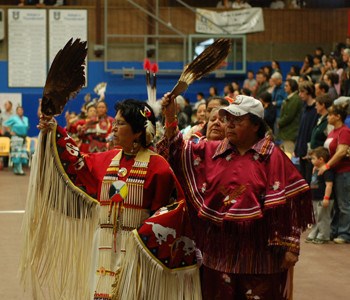An annual student-run powwow focused its theme on trying to keep First Nation languages alive in urban communities.
The Lakehead University Native Student Association with Confederation College Oshki Anishnawbeg Student Association held the annual powwow at the C.J. Sanders Fieldhouse. The weekend event featured drumming, dancing and a feast on Saturday.
Archie Mekanak, coordinator for the powwow, said he chose language as part of the theme because of concerns he had of First Nation students forgetting how to speak an Aboriginal language.
Mekanak, from Algonquin First Nations, had students come to him to translate words into Oji-Cree. He said students living in an urban environment begin to forget how to speak traditional languages because they don’t have a chance to practice.
"Students are losing their culture," Mekanak said, "It’s easy to get the language but you have to practice. You have to really want it to get the language back."
Carrianne Agawa, 42, danced during the opening ceremonies and has done so for four years. A member of White Fish River First Nation, she graduated from Lakehead University with a masters in Education in 2008.
Agawa said Aboriginal languages should be more open in schools and should allow non-Aboriginals to take First Nation language classes if they wanted to.
Students from First Nation communities traditionally speak English as a second language. Despite communities fluent in traditional languages, Agawa said there is a concern that Aboriginal languages could be lost if not enough attention is focused on it.
"We need to keep being diligent," Agawa said. "We need to keep it focused in schools so it is not just a secondary component but becomes a core component."
Agawa first danced when she was 16 years old and said when she dances, as it is form of prayer. She said the powwow is important so the older generation can model the traditional dancing to the younger generation.
"When we have events like this the youth can come out to participate even if they aren’t dancing or wearing regalia they still get to come out and see how we interact and how we dance," she said.
Sarah Nelson, secretary of Lakehead University Native Students Association, said five students make of the committee that helped organize the event. A student in Indigenous Learning program, she said volunteering to help out with the powwow was a natural fit with getting involved with native organizations as a career.
The powwow aimed to create more awareness for those not familiar with Aboriginal culture. Nelson said there needed to be more events to further encourage people to learn more about Aboriginal traditions.
"I think people need to get back to that traditional aspect of their culture," Nelson said. "We’re losing out identity by forgetting about it. For me it is helpful to have that connection to God. Some people go to churches, we celebrate with powwows and smudges."
Nelson said she hoped to have a 1,000 people come and participate. The powwow concludes with a closing ceremony at 5 p.m. on Sunday.
Sign in or register
- Messages
- Post a Listing
- Your Listings
- Your Profile
- Your Subscriptions
- Your Likes
- Your Business
- Support Local News
- Payment History
Registered Users
Already have an account?
New Users
Create a free account.
